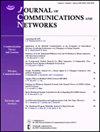An improved SCMA codebook design based on uniquely decomposable constellation groups
IF 3.2
3区 计算机科学
Q2 COMPUTER SCIENCE, INFORMATION SYSTEMS
引用次数: 0
Abstract
In this paper, we propose an improved uniquely decomposable constellation group (I-UDCG) for codebook design of sparse code multiple access (SCMA) systems, which guarantees that the superimposed constellation of SCMA codebooks on each mapping resource satisfies the uniquely decomposable constraint. We optimize the bit error rate (BER) performance of the I-UDCG-based SCMA codebooks from two perspectives. One is to maximize the coding gain of the superimposed constellation of the I-UDCG, using the error probability bound (EPB) as the optimization criterion. The EPB is determined by a threshold distance rather than the minimum Euclidean distance (MED) among constellation points. The other approach focuses on maximizing the MED among the codebook's codewords to enlarge the coding gain of SCMA codebooks, thereby improving the BER performance of SCMA systems. Simulation results show that the two optimization methods can enhance the BER performance of SCMA. In particular, the first optimization method performs better in scenarios involving both small-size and large-size codebooks. Compared to other codebook design schemes, our proposal can exhibit strong anti-noise and antifading abilities for various codebook sizes.基于唯一可分解星座群的改进SCMA码本设计
本文针对稀疏码多址(SCMA)系统的码本设计,提出了一种改进的唯一可分解星座群(I-UDCG),保证了每个映射资源上的SCMA码本叠加星座满足唯一可分解约束。我们从两个角度优化了基于i - udcg的SCMA码本的误码率(BER)性能。一是利用误差概率界(error probability bound, EPB)作为优化准则,使I-UDCG叠加星座的编码增益最大化。EPB由星座点间的阈值距离而不是最小欧几里得距离(MED)来确定。另一种方法侧重于最大化码本码字间的MED,以增大码本的编码增益,从而提高码本系统的误码率性能。仿真结果表明,这两种优化方法都能提高系统的误码率。特别是,第一种优化方法在涉及小尺寸和大尺寸代码本的场景中表现更好。与其他码本设计方案相比,我们的方案在各种码本尺寸下都具有较强的抗噪声和抗衰落能力。
本文章由计算机程序翻译,如有差异,请以英文原文为准。
求助全文
约1分钟内获得全文
求助全文
来源期刊
CiteScore
6.60
自引率
5.60%
发文量
66
审稿时长
14.4 months
期刊介绍:
The JOURNAL OF COMMUNICATIONS AND NETWORKS is published six times per year, and is committed to publishing high-quality papers that advance the state-of-the-art and practical applications of communications and information networks. Theoretical research contributions presenting new techniques, concepts, or analyses, applied contributions reporting on experiences and experiments, and tutorial expositions of permanent reference value are welcome. The subjects covered by this journal include all topics in communication theory and techniques, communication systems, and information networks. COMMUNICATION THEORY AND SYSTEMS WIRELESS COMMUNICATIONS NETWORKS AND SERVICES.

 求助内容:
求助内容: 应助结果提醒方式:
应助结果提醒方式:


